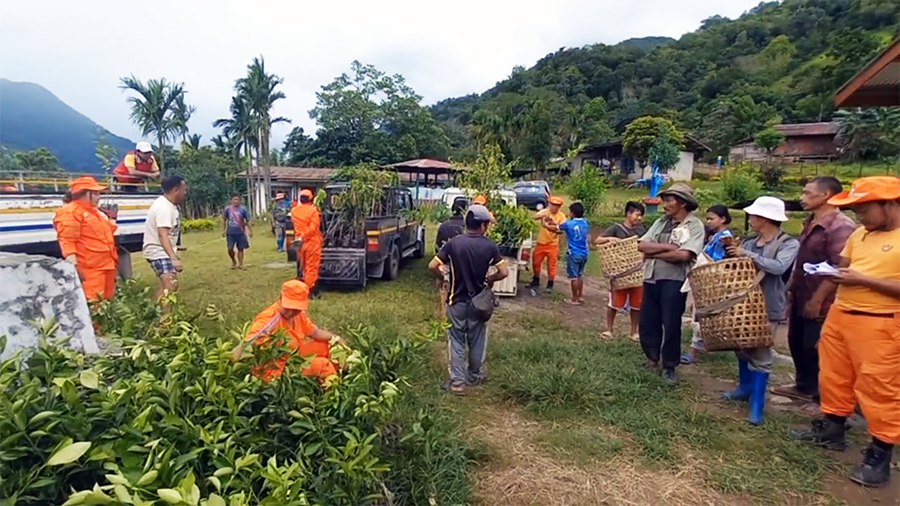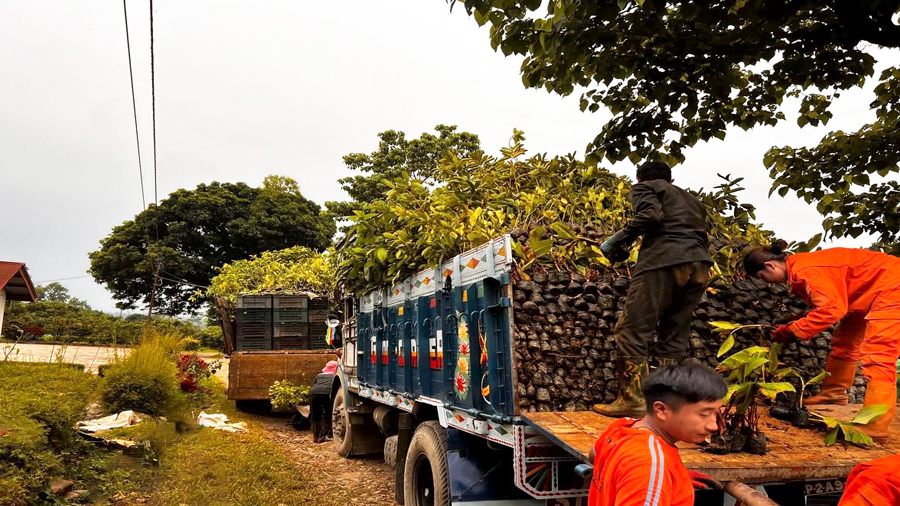
Picture Courtesy: Department of Agriculture
With more than 1.3 million fruit trees including mortality replacement of the first phase of the project planted across the country, the second phase of the Million Fruit Tree Plantation Project was completed on Monday. This time, the initiative focused on fewer fruit seeds but high-value ones that can generate more revenue. This joint initiative by DeSuung National Service and the Ministry of Agriculture and Livestock aims to improve the livelihood of rural communities.
 In this phase, the focus was on planting 13 high-value fruit crops such as almonds, pecan nuts, walnut, kiwis, avocados, dragon fruit, Irwin mango, mandarin, Macadamia nut, seedless lime, sour sop, agarwood, and coconut.
In this phase, the focus was on planting 13 high-value fruit crops such as almonds, pecan nuts, walnut, kiwis, avocados, dragon fruit, Irwin mango, mandarin, Macadamia nut, seedless lime, sour sop, agarwood, and coconut.
Around 2,000 DeSuups including 200 trained by the Agriculture Research and Development Centres assisted in implementing the project.
The second phase project, inaugurated in February this year planted less than 130,000 fruit trees in Chhukha, 118,000 in Samtse, a little less than 105,000 in Pema Gatshel and more than 80,000 in Dagana.
Like-wise Gasa and Thimphu districts saw the least number of plantations with over 1,800 and 3,800 respectively.
The Ministry of Agriculture and Livestock aims to scale up fruit crop plantations with high-value crops on a large scale. The program will continue for at least the next three years.
‘‘If we assess the current scenario, we have just any normal fruit crops both in subtropical and temperate regions. But we intend to enhance that with the high-value varieties. And with skill in the earlier situation we used to promote fruit tree development but with very limited scale and very normal fruit trees. With his Majesty’s command and the vision that we received we started last year as the first million fruit tree and today we are into second,’’ said Yonten Gyamtsho, director of the Department of Agriculture.
During the second phase, plants that did not survive the first phase were replaced.
A survey conducted by DeSuups last year revealed a mortality rate of plants at about 30 per cent in the first phase.
‘‘We found out that about 30 per cent of the plants that were planted did not survive meaning there was 30 per cent of mortality. And this is mainly because we handled quite a big number of million fruit trees is a big number for us that we handle for the very first time and because of the large number then we had to involve quite several people who are involved in the Plantation. So, therefore, handling was one reason and also this was imported from a long distance,’’ added the director.
The trees are expected to bear fruits within three to five years, which will enhance the livelihoods of farmers and benefit the country’s economy.
On average, the tree will bear fruits for at least 15 years. The government invested more than Nu 150 to 200 M in the project and expects to generate more than Nu 2.7bn annually.
‘‘We are expecting around Nu 2.7bn per year and that would continue for the footing period of more than 15 years. So Nu 2.7bn into 15 years is huge and we are not only doing just one million. So we are already into a second million. So likewise, we will go into at least five years and that would accrue quite a revenue that we are expected,’’ further added the director.
The Million Fruit Tree Plantation Project will benefit more than 40,000 farmers as well as schools, government agencies, dratshangs and private companies.
The first phase of the Million Fruit Tree Plantation project, launched in March last year planted fruit seeds of 22 different varieties across the country within two and a half months.
Karma Wangdi
Edited by Sonam Pem








